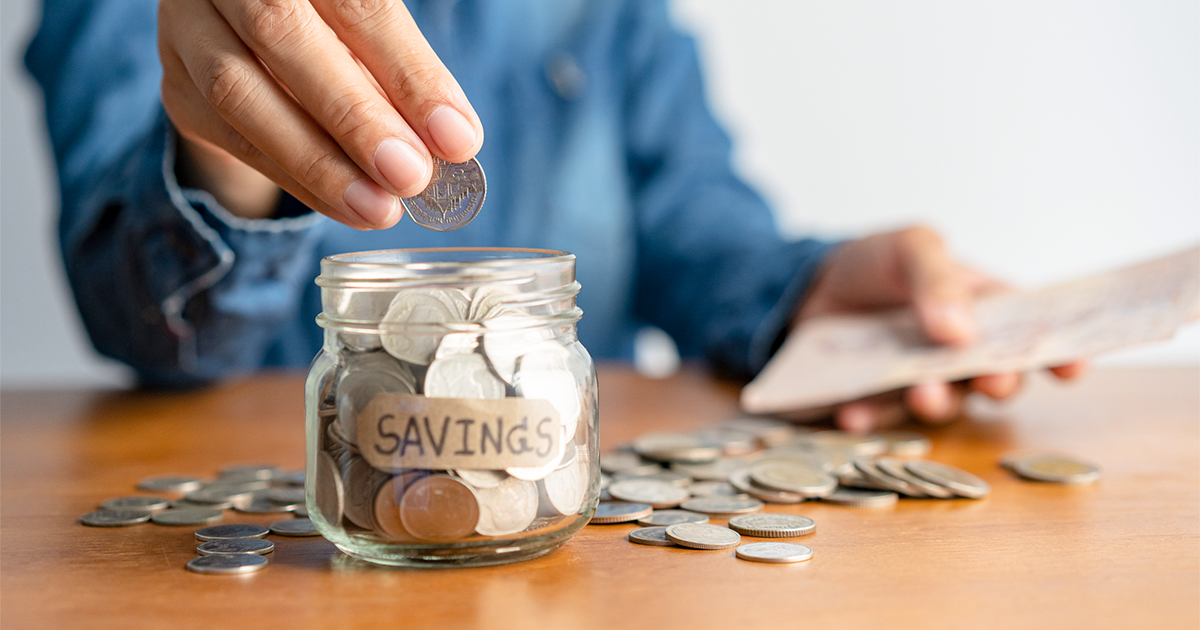
How to Have Your Own Back: Guide to Understanding and Opening a Savings Account
Let’s talk savings. If your car broke down right now, would you have the money to cover the repair, rental, and/or replacement? I drive a 20+ year old minivan so I’m constantly paranoid about unexpected car expenses. You with me? Turns out, almost HALF of all Americans would struggle to pay for a $250 “surprise” like a car repair.
What if you’re facing income difficulties, or don’t have much money set aside? Now might be a good time to start saving. Here’s our guide on how to open a savings account. We’ll cover what it is, different types of accounts, possible fees and features, and some alternatives to think about.
What is a savings account and how does it work?
Basically, a savings account is when you set your money aside in a financial institution like a bank or credit union. The bank holds and invests your money, and they’ll pay you a small amount of interest.
Here’s the plus side for you: you keep your nest egg in a safer place than a piggy bank, keep building it with regular deposits, and make withdrawals or transfers when necessary.
Uses for a savings account.
One common use is an emergency fund for unexpected expenses like a car or home repair, or in case you lose your source of income. Then there’s retirement savings which is important to consider even if you feel like retirement is in the very distant future. Other uses for your savings might include saving for a future goal like a newer car, a down payment for a home purchase, or a family vacation.
How much money you SHOULD save?
The amount of money you should have in your savings account depends on you and your goals. For an emergency fund, typically a good goal is to save 3-6 months of living expenses.1 For other savings, it depends on where you’re at in life.
For example, someone in their 20’s might want to focus on paying off debts. But someone in their late 50’s might want to have about 6x their annual salary saved up for retirement,2 not to mention health expenses, home and car repairs, and annual Christmas gifts for grandchildren.
Can you LOSE money in a savings account?
If your savings account is with a national bank or a reputable credit union, chances are you won’t lose your money. That’s because those financial institutions are probably FDIC insured, which means that the FDIC (Federal Deposit Insurance Corporation) will back your savings in case the bank fails, up to $250,000.
What’s the difference between a SAVINGS account and a CHECKING account?
When utilizing a checking account, your money is more easily accessible—you probably have a debit card and/or checkbook that you use to pay bills directly from your account.
When utilizing a savings account, you usually earn more in interest but the number of withdrawals and/or transfers might be limited. Most savings accounts won’t come with checks or a debit card, so it’s harder to use a savings account for paying bills.
Different types of savings accounts
While there are many options when it comes to savings accounts, some of the most common types include:
Individual account
If you don’t already have one, this is probably the first one to start, and it’s just in one name: yours.
Joint account
This is most commonly used for couples who manage their money together, adult children who share a bank account with their elderly parent, or parents opening a joint account with their children.
Retirement savings
Retirement savings typically take the form of an investment account like a 401K, IRA, or pension plan.
Things to consider before you open a savings account
It’s a good idea to explore options before signing up for a savings account. Gathering information and comparing offers from financial institutions is a great way to ensure you get the account that will work best for your needs and goals. You might pay special attention to the details surrounding the following while gathering information:
Low fees
You might not have ANY fees if you go with the same bank as your checking account.
FDIC insured
This is usually displayed at the bottom of the bank’s website, but you can also call the FDIC at 877-275-3342 or use their BankFind tool.3
Bonuses
Sometimes banks will offer sign-up bonuses ($100?? CHA-CHING!) for new accounts with certain minimum initial deposits.
Easy withdrawals and deposit
Can you make at least five withdrawals each month? Will you be able to make deposits online, or will you have to visit a branch during banking hours?
Low minimum balance requirement
How much money will you need to keep in the account at all times to avoid fees?
High APY
Will your money make money? In other words, will you earn a high APY (Annual Percentage Yield), or will it be less than 0.50%?
Low initial deposit
How much money will you need to deposit up front in order to open the account?
Automatic transfers
An easy way to build up your savings with minimal hassle is to set an automatic, recurring transfer from your checking account to your savings account. $25-50 might be a great place to start.
Envelopes or buckets
If you have multiple goals, you could use envelopes or buckets, which are offered by many online savings accounts.4 These envelopes or buckets are essentially sub-accounts which keep your funds in their own separate accounts or categories. This could help you visualize your savings and stay organized while still earning and compounding interest on your total savings balance.5
What you might need to open a savings account
Each financial institution has slightly different requirements, but here are some common ones:
- Driver’s license or photo ID
- Social Security Number
- Account number and routing number (to fund your account)
- Email address
- Date of birth
Alternatives
A traditional savings account might not be the right answer for everyone. If you’re looking for higher APY or more accessibility, here are some common alternatives to a savings account:
Money market account
These usually have a higher APY but might require a higher initial deposit as well.
Checking account
If you need access to your savings multiple times every month, a high interest checking account might be a good option.
Certificate of deposit (CD)
A CD is usually good for larger amounts of money over longer periods of time. According to the U.S. Securities and Exchange Commission, a CD is one of the safest savings options.6
U.S. savings bond
This is basically like loaning money to the federal government—you buy a bond for $25-$10,000, and after 20+ years, you can cash it out to get back your money plus interest. To purchase a savings bond online, you first need to open an account with TreasuryDirect.gov.
What if you don't have a bank account?
You do not always have to have a bank account in order to open a savings account. Some people prefer to keep their savings in an account separate from all of their checking accounts and debit cards. If you choose, you can have a savings account and instead of utilizing a bank account you could opt for a Green Dot® Visa® Debit Card available at Speedy Cash. Green Dot® Visa® Debit Cards are a fantastic option that you can reload, and even come with a routing and account number so you could set up direct deposit as well. You can apply for a Green Dot Visa Debit Card at any Speedy Cash location, but keep in mind that some transactions may have restrictions and fees may apply. Stop by a Speedy Cash near you to get answers to any questions you may have and to apply today.
Start saving now
No matter where you are in your savings journey or whether you choose to utilize a savings account or not, it’s never too late to start. It’s a great idea to shop around for the best savings account for your situation. Remember to consider all applicable fees and the features you want included. Once you decide on one, gather the required info, open the account, and start saving a bit every month. Happy saving!
Sources:
- Ramsey Solutions. (n.d.) Dave Ramsey’s 7 Baby Steps. Retrieved from: https://www.daveramsey.com/dave-ramsey-7-baby-steps#baby_step_3.
- O’Neill, B. (2018, January). Financial Planning Milestones for Different Ages. Retrieved from: https://njaes.rutgers.edu/sshw/message/message.php?p=Finance&m=364.
- FDIC. (n.d.). Deposit Insurance FAQs. Retrieved from: https://www.fdic.gov/deposit/deposits/faq.html.
- McGurran, B. (2021, January 6). How to Budget Using Multiple Accounts. Retrieved from: https://www.experian.com/blogs/ask-experian/how-to-budget-using-multiple-accounts/.
- Ally. (2020, February 3). Buckets and Boosters: Make Your Money Perform Smarter Than Ever With Our New Smart Savings Tools. Retrieved from: https://www.ally.com/do-it-right/banking/what-are-ally-banks-savings-buckets-and-boosters/.
- U.S. Securities and Exchange Commission. (n.d.) Certificates of Deposit (CDs). Retrieved from: https://www.investor.gov/introduction-investing/investing-basics/investment-products/certificates-deposit-cds.
- Treasury Direct (.n.d.). Series EE Savings Bonds. Retrieved from: https://www.treasurydirect.gov/indiv/research/indepth/ebonds/res_e_bonds.htm.


